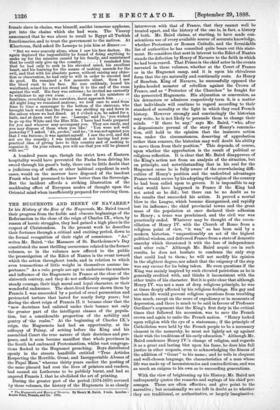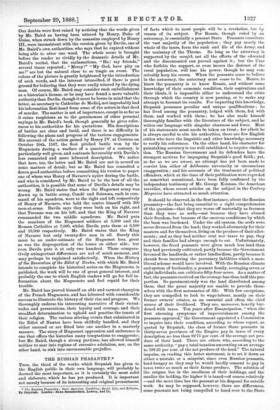THE HUGUENOTS AND HENRY OF NAVARRE.* IN his History of
the Rise of the Huguenots, Mr. Baird traced their progress from the feeble and obscure beginnings of the Reformation to the close of the reign of Charles IX., when, by reason of heroic struggles, they had gained a high place in the respect of Christendom. In the present work he describes their fortunes through a critical and exciting period, down to the formal recognition of their right of conscience. "As," writes Mr. Baird, " the Massacre of St. Bartholomew's Day constituted the most thrilling occurrence related in the former volumes, so in the volumes now offered to the public the promulgation of the Edict of Nantes is the event toward which the action throughout tends, and in relation to which even transactions of little weight in themselves assume im- portance." As a rule, people are apt to underrate the numbers and influence of the Huguenots in France at the close of the sixteenth century, and they do not sufficiently recognise their steady courage, their high moral and loyal character, or their wonderful endurance. The short-lived favour shown them by Francis I. was succeeded by a period of cruel persecution and protracted torture that lasted for nearly forty years; but during the short reign of Francis II. it became clear that the "new doctrines had enlisted under their banner not only the greater part of the intelligent classes of the popula- tion, but a considerable proportion of the nobility and gentry of 'the realm." At the beginning of Charles IX.'s reign, the Huguenots had had an opportunity, at the colloquy of Poissy, of setting before the King and his assembled Court the true nature of their doctrines and pur- poses, and it soon become manifest that whole provinces in the South had embraced Protestantism, whilst vast congrega- tions flocked to the Huguenot preaching. Boys distributed openly in the streets handbills entitled "True Articles Respecting the Horrible, Great, and Insupportable Abuses of the Papal Mass," whereas thirty years earlier the posting of the same placard had cost the lives of printers and readers, had caused six Lutherans to be publicly burnt, and had so angered Francis I. that he abolished the art of printing.
During the greater part of the period (1574-1610) covered by these volumes, the history of the Huguenots is so closely
• The Huguenots and Henry of Navarre. By Henry K. Baird. 2 role. London : Regan Panl, Trench, and Co. 1886. interwoven with that of France, that they cannot well be treated apart, and the history of the one is, in fact, a history of both. Mr. Baird claims, at starting, to have made con- scientious use of every available source of accurate knowledge, whether Protestant or Roman Catholic, and the formidable list of authorities he has consulted quite bears out this state- ment. He considers that next in interest to the Edict of Nantes stands the defection by Henry of Navarre to the faith in which he had been reared. That Prince is the chief actor in the events narrated in these volumes, whether at the Court of France or in the Huguenot camp, and it is upon his chivalrous form that the eye naturally and continually rests. As Henry of Bourbon, King of Navarre, he successfully opposed the hydra-headed monster of rebellion against the Crown of France, and as " Protector of the Churches " he fought for the persecuted Huguenots. His abjuration or conversion, as his detractors or admirers respectively term it, is a matter that individuals will continue to regard according to their standard of morality or the light in which they read French history. However strongly and convincingly the historian may write, he is not likely to persuade them to change their minds. " If there be any," says Mr. Baird, " who, after a dispassionate perusal of the story of Henry's renuncia- tion, still hold to the opinion that the insincere action was, under the circumstances, deserving of approbation rather than censure, the historian may well doubt his ability to move them from their position." This depends, of course, upon whether the approbation is the result of political or religious reflection. It is clear that Mr. Baird disapproves of the King's action not from an analysis of the situation, but on principle, and notwithstanding that in his zeal for the Huguenot cause he is fully aware of the overwhelming diffi- culties of Henry's position and the undoubted advantages France would secure by his adopting the religion of the country he had been called upon to govern. It is impossible to say what would have happened in France if the King had not acted as he did ; but there can be no doubt as to the results that succeeded his action. It proved a mortal blow to the League, which became disorganised, and rapidly lost its influence; the chief provincial towns and the great mass of the population at once declared their adhesion to Henry; a truce was proclaimed, and the civil war was practically ended. Whatever may be thought of the recon- ciliation of Henry IV. with the Church of Rome from a religious point of view, "it was," as has been said by a modern historian, " unquestionably an act of the highest political wisdom, and delivered France from a state of domestic anarchy which threatened it with the loss of independence and utter ruin." Although Mr. Baird acquie .ces in such results, he does not hesitate to condemn the only step that could lead to them ; he will not modify his opinion in the slightest degree, nor admit that the exigency of the step was any excuse for its being taken. He even questions if the King was mainly inspired by such elevated patriotism as he is generally credited with, and thinks it inconsistent with the other traits of his character. But it is quite clear that although Henry IV. was not a man of deep religious principle, he was at times deeply affected by his religious feelings. His gay and careless life would prevent religious questions from troubling him much, except on the score of expediency or in moments of depression, and there is much to be said in favour of Professor Gardiner's argument that the King's first duty in the critical times that followed his accession, was to save the French crown and again to unite the French nation. " Henry looked upon religion with the eye of a statesman; if the principle of Catholicism were held by the French people to be a necessary element in the monarchy, he must not lightly set up against their wish the traditions of his early education." Although Mr. Baird condemns Henry IV.'s change of religion, and regards it as a great and lasting blot upon his fame, he does him full justice in other respects, even to acknowledging the fitness of the addition of " Great " to his name ; and he tells in eloquent and well-chosen language, the characteristics of a man whose life was made up of inconsistencies and contradictions, and was as much an enigma to his own as to succeeding generations.
With the view of brightening up his History, Mr. Baird not unfrequently quotes the remarks and sayings of his chief per- sonages. These are often effective, and give point to the narrative ; but occasionally we are left in doubt as to whether they are traditional, or authoritative, or largely imaginative. Our doubts were first raised by noticing that the words given by Mr. Baird as having been uttered by Henry, Duke of Guise, when struck down by the assassins employed by Henry III., were inconsistent with the version given by Davila, one of Mr. Baird's own authorities, who says that he expired without being able to utter one word. The whole scene is brought before the reader so vividly by the dramatic details of Mr. Baird's recital, that the exclamations, " Ha! my friends," several times repeated ; " Mercy !" " My God, have pity on me !" are but the natural close to so tragic an event. The colour of the picture is greatly heightened by the introduction of such words, and the interest intensified, if there is good ground for believing that they were really uttered by the dying man. Of course, Mr. Baird may consider such embellishment as a historian's license, or he may have found a more valuable authority than Davila, though it must be borne in mind that the latter, as secretary to Catherine de Medici, not improbably had his information first-hand from some of the actors in that deed of murder. The matter is not of importance, except in so far as it raises suspicions as to the genuineness of other personal sayings in Mr. Baird's book, though generally he gives refer- ences to his authorities for his quotations. His descriptions of battles are clear and lucid, and there is no difficulty in following the plans and progress of the various engagements. His account of the action gained by Henry IV. at Contras on October 20th, 1587, the first pitched battle won by the Huguenots during a warfare of a quarter of a century, is particularly well given, and contrasts favourably with Davila's less connected and more laboured description. We notice that here, too, the latter and Mr. Baird are not in accord on some matters of detail ; but as Mr. Baird has consulted a dozen good authorities before committing his version to paper one of whom was Henry of Navarre's squire during the battle, and who is considered by Mr. Baird to be the best of all the authorities, it is possible that some of Davila's details may be wrong. Mr. Baird states that when the Huguenot army was drawn up in battle array, Conde and Soissons, each in com- mand of his squadron, were to the right and left respectively of Henry of Navarre, who held the centre himself with 300 men-at-arms. Davila says they were both on his right, and that Turenne was on his left, and that the King of Navarre commanded the two middle squadrons. Mr. Baird puts the numbers of the Huguenot soldiers at 5,500 and the Roman Catholics at 7,000, whilst Davila puts them at 6,500 and 10,000 respectively. Mr. Baird states that the King of Navarre lost only twenty-five men in all. Surely this must be an under-estimate of the Huguenot loss, great as was the disproportion of the losses on either side ; but even Davila puts it at only two hundred. These compara- tively unimportant differences are not of much moment, and may perhaps be explained satisfactorily. When the History of the Revocation of the Edict of Nantes, with which Mr. Baird intends to complete his historical series on the Huguenots, is published, the work will be one of great general interest, and probably the one to which English readers will go for full in- formation about the Huguenots and feel repaid for their trouble.
Mr. Baird has proved himself an able and earnest champion of the French Huguenots, and has laboured with considerable success to illustrate the history of their rise and progress. We thoroughly endorse his interesting narrative of their vicissi- tudes and persecutions, their loyalty and courage, and their steadfast determination to uphold and practise the tenets of their religion. The various stirring events that culminated in the Edict of Nantes have been skilfully handled, and they either succeed or are fitted into one another in a masterly manner. The story of Huguenot oppression and endurance is one that offers the historian many temptations to exaggerate ; but Mr. Baird, though a strong partisan, has allowed himself neither to soar into regions of excessive adulation, nor, on the other hand, to sink into unreasonable prejudice.







































 Previous page
Previous page